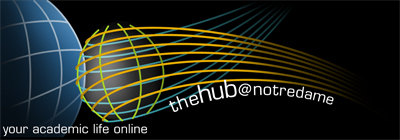
The newest student publication at the University of Notre Dame has no small ambition: It wants to influence the way every student engages in intellectual life. And it’s going to do so without ever using a piece of paper.
The Hub, found at thehub.nd.edu with the slogan “Your academic life @ ND,” is drawing on the lessons of the burgeoning social media world to create what essentially is more of an environment than a publication.
It officially launched Oct. 28 with a celebration in LaFortune Student Center. The Nov. 3 Notre Dame Forum presentation featuring author Thomas L. Friedman provided The Hub its first opportunity to launch a discussion around an issue important to campus.
In the inaugural edition, the dominant content involves personalized blog-type entries that touch on the experiences that The Hub editors are hoping to influence: being a student abroad; how to land, and survive, an internship; how to get funding for summer research or to identify a service opportunity. Along with undergraduate student research, these are the elements that define the learning experience, says co-editor-in-chief junior Kirsten Adam, who shares duties with junior Paul Baranay.
Anyone with Internet access can view the content. Only students can log on for a deeper experience. They can join a discussion or start a discussion group or launch a blog. They also can upload samples of work such as research papers, visual art or multimedia presentations and ask their peers for feedback.
“It’s a living document of all the things you’ve been working on at Notre Dame,” Adam said.

For several years, the undergraduate research program has attempted to use technology to allow students to post and share their work, explains Cecilia Lucero, assistant director for undergraduate research at the Center for Undergraduate Scholarly Engagement (CUSE). The Hub is a CUSE-sponsored initiative; several other units on campus also provide funding, and Lucero serves as the advisor.
With the advent and growing popularity of social media, students saw the opportunity to create an online community. Lucero says that social media and multi-media technology allow students to participate in intellectual life in non-traditional ways.
“I honestly think students want to engage. They definitely care about a lot of issues,” Lucero says. “But maybe they’re a little intimidated.”
The Hub provides a vehicle that students are comfortable using in order to share their work and perspectives about academic life.
As many an Internet “comment” section shows, topical online dialogue draws frank participation. And the group itself is never limited by the size of the table or dorm room where students have assembled, notes Baranay.
Once the site is running at full speed, the editors’ job will be to watch what’s popular, and keep students engaged, he adds. And they’ll work to establish a leadership structure that allows the site to adapt and prevail long after the current editors have graduated.